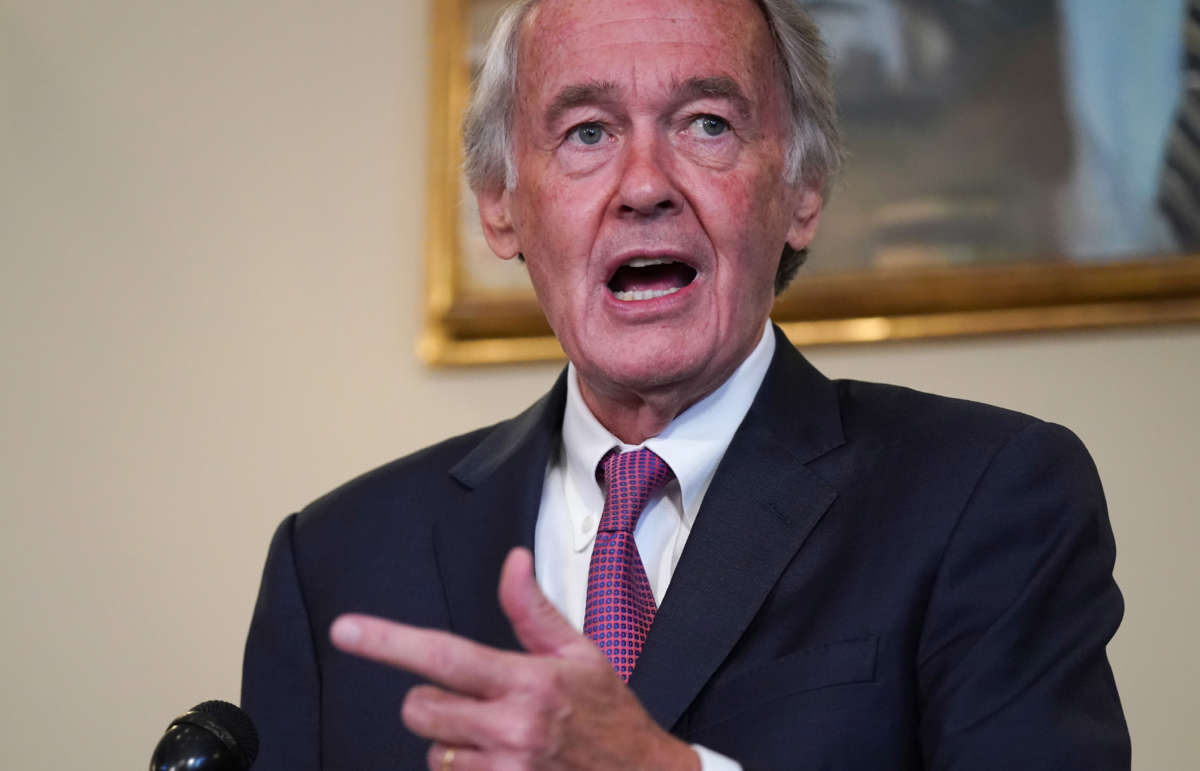Sen. Ed Markey (D-Massachusetts) has decried the bipartisan infrastructural proposal as a form of “climate denial” for its apparent exclusion of many climate provisions that were in President Joe Biden’s original plan.
“It sounds like, to me, that they have a package which is climate denial masquerading as bipartisanship,” Markey said on MSNBC on Thursday. “We can’t have an infrastructure deal in 2021 that doesn’t have climate at its center. And any other bill that we are gonna consider that does not have aggressive solutions to the climate crisis will just have that response that I’ve been giving, which is: no climate, no deal.”
On Thursday morning, a bipartisan group of ten senators announced that they reached a deal on an infrastructure package. Though the exact contents of the bill aren’t yet public, Sen. Mitt Romney (R-Utah), who is part of the group, indicated that climate provisions are largely absent from their proposal.
“The Democrats’ agenda on climate change is probably something they’re going to pursue, by and large, outside of an infrastructure bill,” Romney told reporters. There will be some small proposals on climate, the senator clarified, and listed four line items on nuclear power, direct air capture, hydrogen power and “CO2 pipelines.”
Climate advocates have said that the infrastructure bill may be Biden’s best and only chance of reaching the ambitious climate goals that he’s pledged to uphold.
Senators Ron Wyden (D-Oregon) and Martin Heinrich (D-New Mexico) threatened to withhold their votes on the infrastructure bill if it does not sufficiently address the climate crisis, joining progressives like Rep. Jamaal Bowman (D-New York) in the House who have issued similar warnings.
“My view is that the Democratic party won in 2020 on this issue [of the climate crisis] — the House, the Senate and the presidency,” said Markey on Thursday. “And it was driven by millions of young people all across our country who rose up, went out to the polls, they worked hard — and they have a big IOU that they should be able to call in. I think that Democrats across America are going to stand up and demand that we pass a climate package and infrastructure bill that is worthy of the name.”
Markey has also issued a starker warning than most other Democrats on the bill, if the White House does eventually exclude or sideline climate action. “I won’t just vote against an infrastructure package without climate action,” he tweeted on Thursday, “I’ll fight against it.”
The Connecticut senator has already demonstrated what kind of bill he would prefer: In April, Markey, along with climate advocates, unveiled a $10 trillion climate justice bill that rivals Biden’s plan, calling for much larger investments in clean energy and justice initiatives. The THRIVE Act, Markey and advocates have argued, is closer to the magnitude of spending and change that the country needs to address the climate crisis.
Republicans like Romney in the group are still adamantly opposed to Biden’s proposals to raise taxes on wealthy people and corporations for the bill. Instead, they want the bill to be funded by indexing gas taxes to inflation, which, similar to Senate Republicans’ user fees proposal, would end up disproportionately affecting the middle- and working classes. The White House is reportedly prepared to reject the gas tax to stay in line with Biden’s promise to not raise taxes on people making less than $400,000 a year.
Our most important fundraising appeal of the year
December is the most critical time of year for Truthout, because our nonprofit news is funded almost entirely by individual donations from readers like you. So before you navigate away, we ask that you take just a second to support Truthout with a tax-deductible donation.
This year is a little different. We are up against a far-reaching, wide-scale attack on press freedom coming from the Trump administration. 2025 was a year of frightening censorship, news industry corporate consolidation, and worsening financial conditions for progressive nonprofits across the board.
We can only resist Trump’s agenda by cultivating a strong base of support. The right-wing mediasphere is funded comfortably by billionaire owners and venture capitalist philanthropists. At Truthout, we have you.
We’ve set an ambitious target for our year-end campaign — a goal of $250,000 to keep up our fight against authoritarianism in 2026. Please take a meaningful action in this fight: make a one-time or monthly donation to Truthout before December 31. If you have the means, please dig deep.
